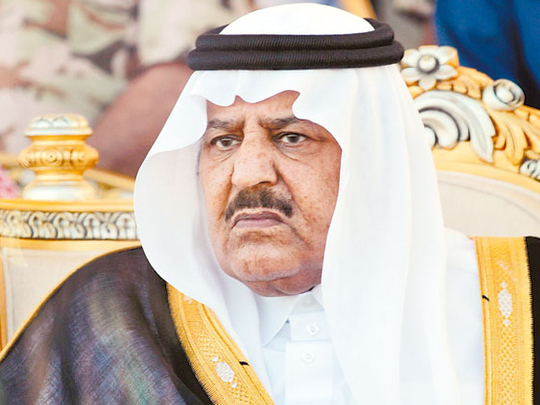
Riyadh: Saudi Arabia’s powerful crown prince Nayef Bin Abdul Aziz was a long-serving interior minister who led an iron-fisted crackdown on Al Qaida.
Prince Nayef, 79, was seen as more conservative than his half brother King Abdullah Bin Abdul Aziz, and a pragmatist who liked to describe himself as a soldier under the command of the Saudi monarch.
The crown prince was known for his solid relations with the kingdom’s religious elite and was believed to have opposed reforms that could liberalise the ultra-conservative Islamic society.
He was known for his suspicion and mistrust of Saudi Arabia’s arch-rival Iran, and had pushed for hardline policies towards the Shiite nation.
Interior minister for more than three decades, Nayef enjoyed strong relations across the Arab region.
Diplomats said he played a key role in Riyadh’s decisions to host Tunisia’s ousted strongman Zine Al Abidine Bin Ali after his January 2011 overthrow, and to send troops in March last year to Bahrain to help end Shiite-led protests.
Born in the western city of Taif in 1933, Nayef was quickly pushed into public service, being named governor of Riyadh when he was barely 20.
His elder brother Fahd brought him into the interior ministry, where he was named deputy minister in 1970 and minister five years later, when Fahd became crown prince.
Nayef was credited for the successful crackdown on Al Qaida militants in subsequent years, halting their wave of bloody attacks on the kingdom between 2003 and 2006.
His internal security campaign forced Al Qaida leaders and many members to flee to southern neighbour Yemen, where they formed Al Qaida in the Arabian Peninsula (AQAP), which continued to threaten Saudi interests.
Charged with managing the country’s borders, its internal crime-fighting apparatus and the internal intelligence force the mabahith, Nayef dismantled charities which used to collect donations for the late Osama Bin Laden and his extremist network.
Nayef’s son Prince Mohammad, who is the assistant interior minister and the kingdom’s top counter-terrorism official, escaped assassination in 2009 when a suicide bomber from Yemen tried to kill him.
In recent years he transferred day-to-day security responsibilities to Mohammad, who has been even more methodical in pursuing Islamist radicals and battling their ideology.
But critics accused Prince Nayef of targeting democracy and human rights activists while neglecting, until recent years, the rise of Islamic radicalism in the country.
Saudis, however, showed support and appreciation for the strongman persona Nayef reflected because of public perceptions that he could deliver on national security.
Nayef told reporters early in 2009 that he opposed electing members of the consultative Shura council, or to include women in the group. “I don’t see the need for that,” he said.
He defended members of Saudi Arabia’s religious police, who have often been accused of brutality and abuse.
As fall-out from the Arab Spring spread east from Tunisia, Libya and Egypt, the interior ministry played a key role in preventing popular demonstrations in Saudi Arabia.
Prince Nayef publicly thanked Saudis for not answering local activists’ calls for protests.
The ministry also sought to maintain order in the face of increasing unrest in the primarily Shiite-inhabited and oil-rich Eastern province, where the kingdom accuses Iran of inciting the local population against the Sunni-led monarchy.
Among his other full brothers were King Fahd, who died in 2005, Crown Prince Sultan who died in 2011, and Riyadh Governor Prince Salman.












